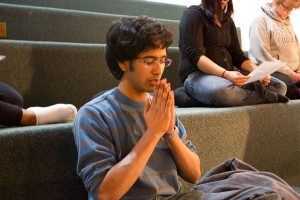Ever had a moment of pure, perfect happiness? A moment in which nothing made you sad or dissatisfied — where you felt perfectly content and at peace with the world around you?

For most of us, that state of pure happiness is always fleeting. As college students, in the midst of midterms and swamped by homework and deadlines, life can be really stressful. But learning how to let go is one approach to coping. Though the idea of detachment may seem daunting, meditation is one way to reduce our fear.
The practice is becoming more popular among college students, especially here at Ithaca College. Many students regularly meditate with the college’s Buddhist community. To them, the sense of peace and detachment that meditation brings is worth the time commitment.
But what would it take to feel this happy all the time? Can humans even aspire to that?
These are some of the questions Siddhartha Gautama, the Indian prince who became the Buddha, sought to answer. Prince Siddhartha grew up in a world of luxury, but when traveling through his kingdom one day, he was deeply struck by the hardship and suffering lived by his people. In that moment, he decided to leave behind his lavish life to seek a way to escape this suffering, for himself and for his people.
For many years, the prince sought his way to salvation. He studied under famous sages and ascetics of his time, such as Alara Kalama or Uddakarama Putta, who inspired and taught people all over ancient India. However, the prince later decided to seek his own path to salvation. At this moment, he began to examine the idea of suffering: what it is, what causes it, and how people could free themselves from it. Eventually, he discovered the idea of attachment.
The Buddha teaches all of us, when overcome by feelings of dissatisfaction, to pause for a moment. If we try to do this, the Buddha believed, we could trace dissatisfaction back to attachments people have to something. This something doesn’t have to be a material object. It can be an idea or even another person. The Buddha said that objects, regardless of their form, are never permanent. They change and, as they change, so does our attachment to them, which causes us to become dissatisfied.

Here in Ithaca, the weather had been sunny and crisp up until fall break. But now the rain is coming down, cold and hard. Not before long, the snow will fall. Those of us who enjoy warm weather will grow more dissatisfied because of our attachment to the summer season.
Hence, the only sure way to be free from perpetual dissatisfaction is to learn how not to become too attached to things.
The challenge then, is how a person can live a full, functional life without attachment. We humans define the world around us in terms of things and our attachment to them in order to help define who we are as people.
The Buddha’s answer would be that humans should learn to enjoy and appreciate the world around them without clinging to things. He tells us to be like a hermit in a rose garden, which feels the urge to appreciate the roses, but not to carry them from the garden.
I encourage everyone to take a moment to contemplate his or her attachments. While contemplating, people may realize how these attachments may lead to dissatisfaction, and eventually to pain. In the end, perhaps a moment’s contemplation is all it takes to find the path to enlightenment.
Adeesha Ekanayake is a sophomore computer science major. Email him at [email protected]






